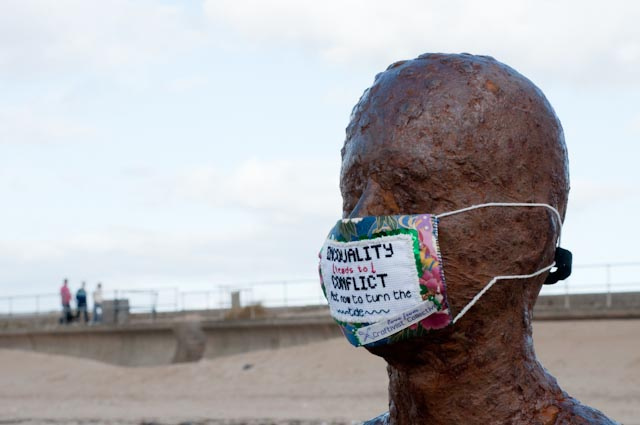Recent developments in the United States vividly illustrate inequality’s threat to democracy
The impact of socio-economic inequality on democracy has long been debated, with most agreed that the democratic notion of equal representation is undermined by large gaps between the wealthiest and poorest citizens. Looking at examples from the United States, Alistair M. Macleod argues that the corporate lobbying is but one manifestation of the malign influence that this imbalance can have on democratic processes.
Concern for the deleterious effects of economic inequality on democracy is not new. The celebrated U.S. Supreme Court Justice Louis Brandeis is reported to have said that “we can have democracy in this country, or we can have great wealth concentrated in the hands of a few, but we cannot have both.”But neither is the concern a thing of the past.
The Occupy Movement has been largely fueled by the recognition that economic elites in societies in which a yawning gulf separates the very wealthy (the 1%) from the rest (the 99%) have been permitted to exercise grossly disproportionate influence in the political domain, thereby undermining the ideal of political equality that is the hallmark of democracy. My article provides an analysis of the ideal of political equality and considers some of the ways it is currently under siege. Although attacks on democratic equality are widespread, US examples, because better known, provide convenient illustrations of the general problem.
Political equality does not require all the members of a democratic society to exercise strictly equal influence over the decisions that determine the shape of its laws, institutions, and policies, but it does call for them to have an equal opportunityto participate effectively in its political decision-making processes.
The opportunity to participate in democratic processes on an equal basis can be unfairly frustrated in a variety of ways. Most visibly, it can be threatened by efforts to restrict the franchise. It’s too late in the day for a return to the bad old days when only property-owners, or males, or whites, had the right to vote. However, less dramatic efforts to undermine the universality of the franchise are currently being made.
Sometimes this is being done by Republican states in the United States, under cover of a drive to prevent voter fraud, by the tightening of voter registration rules – rules, for example, that require presentation of photo ID not possessed by many poorer members of racial and ethnic minorities, who, if they voted, would be likely to vote for Democratic candidates. The enactment of such rules has been accelerated by the recent Supreme Court decision to strike down the part of the 1965 Voting Rights Act that required states with a history of resistance to extending the franchise to blacks to secure the approval of the federal Department of Justice or a federal court in Washington before enacting any changes in voting procedures.
Voter eligibility rules are also being tightened. For example, citizens with a criminal record (however minor the crime) are being deprived of the right to vote, sometimes for life. In the notorious 2000 US Presidential election, the “scrubbing” of federal election rolls in Florida by the elimination of tens of thousands of citizens alleged (in many cases without substantiation of any sort) to be “felons” is held by competent political analysts to have contributed to the failure of Al Gore to win the Presidency. On the basis of a legally contested partial recount of the Florida vote (in which, of approximately 6 million votes cast, the Republican candidate was officially deemed to have received a paltry 537 votes more than his Democratic rival), George W. Bush was declared the new President.
But the ideal of political equality can be undermined in many subtler (and more effective) ways even when the universality of the franchise is not being targeted.
There can be failure to foster equality of educational opportunity, the opportunity, in particular, to participate confidently and knowledgeably in political decision-making processes. There can be refusal to provide all citizens with comparably effective opportunities for political participation. The media can fail to discharge adequately their responsibility to provide suitably comprehensive and impartial coverage of the issues that divide politicians, coverage that is as free as possible of the obfuscating “spin” imparted to these issues by political partisans. There can be opposition to the effecting of structural reforms in the electoral system that would give all citizens a reasonably close approximation to equal representation in legislative bodies through the votes they cast.
While proper implementation of the democratic ideal faces challenges of all these sorts, and while many of these challenges would be of serious concern even in the absence of the dramatic economic inequality that has been increasing in societies with a venerable democratic tradition, the threat they pose to the preservation of democracy has been substantially increased by the role economic elites have been allowed to play in the shaping of public policy. Far from trying to insulate genuinely democratic practices from the distortions generated by permitting the wealthy to exploit their economic clout when they participate in collective decision-making processes, many democratic societies have been enabling economic elites to wield ever-greater influence in the corridors of power.
For example, earlier attempts in the United States to limit the role of money in electoral politics have been modified or abandoned. Rules for the capping of financial contributions to political parties and their candidates have been relaxed, and even the requirement that such contributions be made public has been eliminated for donations of certain sorts. Moreover, the infamous decision of the US Supreme Court (in Citizens United) that authorized the (virtually unlimited) infusion of private money into the financing of political campaigns has immeasurably increased the ability of economic elites to influence (perhaps decisively) the outcome of political debates about the most divisive political issues.
Despite promises by President Obama in the run-up to his election in 2008 that he would endeavour to curtail the role played by lobbyists in the shaping of legislative policies and decisions in Washington, little seems to have been achieved on this front, largely (it seems safe to surmise) because of the enormous power behind the scenes of the economic elites who bankroll lobbyists. The contribution of major financial institutions to the near-collapse of the US economy during the 2007-2009 crisis has been amply documented. Nevertheless, legislative proposals to curtail their power were eviscerated in response to the massively financed lobbying effort mounted by Wall Street. Proposals for the more effective regulation of their activities and for the enforcement of a sharper distinction between banks and investment firms never made it into the laws that were eventually enacted.
It is not uncommon for defenders of democracy to be harshly critical of putative “democracies” in which votes can be bought and sold and in which the practice of bribing public officials is rife. Yet there can be a strange silence about the role paid lobbyists play both in determining the outcome of elections (by the kinds of well-financed strategies they employ to support or oppose candidates in crucial elections) and in influencing the content of important government decisions. Silence of this sort is particularly disturbing because there is no more than a thin line – where such a line exists at all – between (on the one hand) the sort of political corruption that involves the buying and selling of votes and the bribing of officials and (on the other) the sort of lobbying that enables wealthy individuals and organizations to exert undue influence over the content of important political decisions by prevailing on governments to protect their interests in disregard of the larger public interest.
—
Note: this post is a summary of paper entitled “Democracy and Economic Inequality” in Philosophical Perspectives on Democracy in the 21st Century, edited by Ann E. Cudd & Sally J. Scholz (Springer, 2014), pp. 175-188. It represents the views of the author, and not those of Democratic Audit or the LSE. Please read our comments policy before posting. The shortened URL for this post is: https://buff.ly/1duRI6H
—
 Alistair M. Macleod is Professor Emeritus, Department of Philosophy, Queen’s University, Canada.
Alistair M. Macleod is Professor Emeritus, Department of Philosophy, Queen’s University, Canada.






 Democratic Audit's core funding is provided by the Joseph Rowntree Charitable Trust. Additional funding is provided by the London School of Economics.
Democratic Audit's core funding is provided by the Joseph Rowntree Charitable Trust. Additional funding is provided by the London School of Economics.
Recent political developments in the United States vividly illustrate that inequality is a real threat to democracy https://t.co/bbnvk6rimf
RT @democraticaudit Can democracy and inequality coexist? https://t.co/oCJbgJKp1W
Can democracy and inequality coexist? https://t.co/KRMc9Qp3aQ
RT @democraticaudit: Can democracy and inequality coexist? https://t.co/yGIsjTnnJs #A2Politics
Recent developments in the United States vividly illustrate inequality’s threat to democracy https://t.co/ULfbi3VNQW
@citizensrock I hope that you will find the following article on democracy and inequality in the USA interesting
https://t.co/96whTBDLU8
@LindaCollins11 I hope that you might find the following article on democracy and inequality in the USA interesting
https://t.co/96whTBDLU8
Inequality in USA as threat to democracy’ Very good article
https://t.co/96whTBDLU8
MT @democraticaudit: Recent developments in the States vividly illustrate inequality’s threat to democracy https://t.co/bNdV33nNJc cc @temite
Recent developments in the United States vividly illustrate that inequality is a threat to democracy https://t.co/bbnvk6Ilof
Recent developments in the United States vividly illustrate inequality’s threat to democracy : Democratic Audit UK https://t.co/g1lqpNppHl
Recent developments in the United States vividly illustrate inequality’s threat to democracy https://t.co/Jt5RfNl4m4